Copha, a registered trademark of Peerless Foods under license from Unilever and Upfield, is a form of vegetable fat shortening made from hydrogenated coconut oil. Copha is produced exclusively in Australia. It is 100% fat, at least 98% of which is saturated. It also contains soybean lecithin. [1]
It is used in Australia for confectionery, such as rocky road, and a number of foods for children, being an essential ingredient in white Christmas, and in chocolate crackles, which are made from Rice Bubbles, copha and cocoa powder. [2] [3] It is also used as a "chocolate coating" on baked goods, that amounts to a form of compound chocolate.
Concern about the health hazards of hydrogenated fats (trans fats) is a contributor to the declining popularity of Copha-based confectionery. [4]
In New Zealand, it is marketed as Kremelta. Known in Europe as coconut fat, it is available either in its pure form, or in solid form with lecithin added as an emulsifier. In France it is marketed as Végétaline and in Germany and Denmark it is marketed as Palmin. It is not readily available in the United States. [5]

Nutella is a brand of brown, sweetened hazelnut cocoa spread. Nutella is manufactured by the Italian company Ferrero and was introduced in 1964, although its first iteration dates to 1963.

Vegetable oils, or vegetable fats, are oils extracted from seeds or from other parts of edible plants. Like animal fats, vegetable fats are mixtures of triglycerides. Soybean oil, grape seed oil, and cocoa butter are examples of seed oils, or fats from seeds. Olive oil, palm oil, and rice bran oil are examples of fats from other parts of plants. In common usage, vegetable oil may refer exclusively to vegetable fats which are liquid at room temperature. Vegetable oils are usually edible.
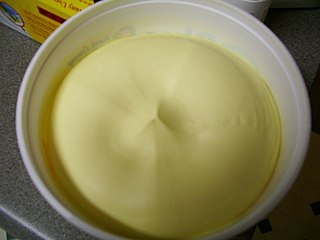
Margarine is a spread used for flavoring, baking, and cooking. It is most often used as a substitute for butter. Although originally made from animal fats, most margarine consumed today is made from vegetable oil. The spread was originally named oleomargarine from Latin for oleum and Greek margarite. The name was later shortened to margarine.
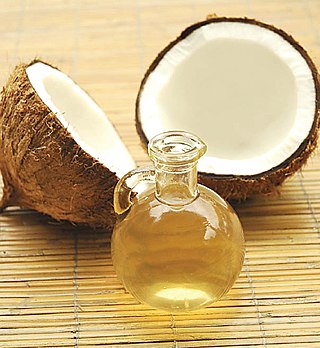
Coconut oil is an edible oil derived from the kernels, meat, and milk of the coconut palm fruit. Coconut oil is a white solid fat below around 25 °C (77 °F), and a clear thin liquid oil at higher temperatures. Unrefined varieties have a distinct coconut aroma. Coconut oil is used as a food oil, and in industrial applications for cosmetics and detergent production. The oil is rich in medium-chain fatty acids.
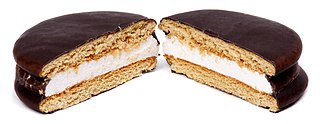
A Moon Pie is an American snack, popular across much of the United States, which consists of two round Graham crackers, with marshmallow filling in the center, dipped in a flavored coating. The snack is often associated with the cuisine of the American South, where they are traditionally accompanied by an RC Cola. Today, MoonPies are made by Chattanooga Bakery, Inc., in Chattanooga, Tennessee.

A macaroon is a small cake or cookie, originally made from ground almonds, egg whites, and sugar, but now often with coconut or other nuts. They may also include jam, chocolate, or other flavorings.

Cottonseed oil is cooking oil from the seeds of cotton plants of various species, mainly Gossypium hirsutum and Gossypium herbaceum, that are grown for cotton fiber, animal feed, and oil.
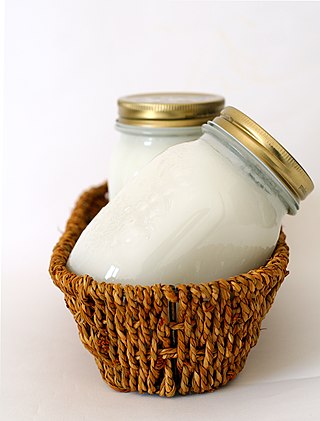
Shortening is any fat that is a solid at room temperature and is used to make crumbly pastry and other food products.
White Knight is a brand of chocolate-coated, chewy, mint-flavoured confectionery bar sold in Australia. Originally produced by Hoadley's Chocolates it was later manufactured by Nestlé Australia. The packaging is blue and white and features a picture of a knight on a horse. Its slogan is 'Mighty Mint Chew'. The product was discontinued in 2016.

White chocolate is a form of chocolate made of cocoa butter, sugar and milk. Unlike milk and dark chocolate, it does not contain cocoa solids, which darken the chocolate. White chocolate has an ivory color, and can smell of biscuit, vanilla or caramel, although it can also easily pick up smells from the environment and become rancid with its relatively short shelf life. Like milk and dark chocolate, white chocolate is used to make chocolate bars and as a coating in confectionery.
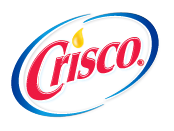
Crisco is an American brand of shortening that is produced by B&G Foods. Introduced in June 1911 by Procter & Gamble, it was the first shortening to be made entirely of vegetable oil, originally cottonseed oil. Additional products marketed under the Crisco brand include a cooking spray, various olive oils, and other cooking oils, including canola, corn, peanut, sunflower, and blended oils.

Maltesers are a British confectionery product manufactured by Mars Inc. First sold in the UK in 1937, they were originally aimed at women. They have since been sold in Europe, Australia, New Zealand, Canada, United States and Middle East. The slogan is "The lighter way to enjoy chocolate".

Chocolate crackles are a popular children's confection in Australia and New Zealand, especially for birthday parties and at school fêtes. The earliest recipe found so far is from The Australian Women's Weekly in December 1937.

Chocolate is a food made from roasted and ground cocoa beans mixed with fat and powdered sugar to produce a solid confectionery. There are several types of chocolate, classified primarily according to the proportion of cocoa and fat content used in a particular formulation.
The U-NO Bar is a truffle type bar with almond bits covered in a thin layer of chocolate, and wrapped in a silver foil-like wrapper. It is comparable to a 3 Musketeers bar in appearance but has a higher fat per gram ratio. Its center is a chocolate, truffle-like fluff covered in a thin layer of milk chocolate and ground almonds. U-NO bars used to come in two flavors: Original and Mint. Annabelle Candy Company has since discontinued the mint flavor.
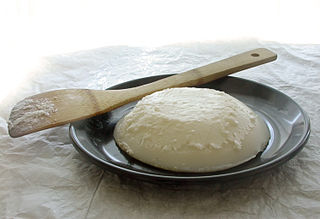
Lard is a semi-solid white fat product obtained by rendering the fatty tissue of a pig. It is distinguished from tallow, a similar product derived from fat of cattle or sheep.

White Christmas is an Australian dessert made from dried fruit such as sultanas, glacé cherries, desiccated coconut, icing sugar, milk powder and Rice Bubbles, with hydrogenated coconut oil as the binding ingredient.
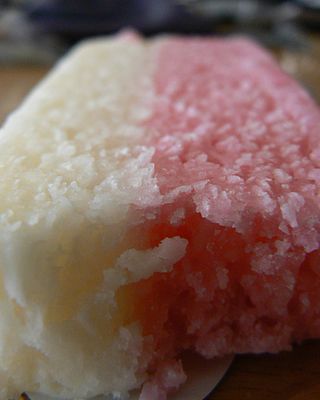
Coconut ice is a British confectionery prepared using grated desiccated coconut or just grated coconut, condensed milk and sugar, which is formed to create a solid, soft candy. It typically has a chewy, soft and mildly grainy texture; some versions are semi-hard. Coconut ice is also available in South Africa, some areas of Australia, and New Zealand.

Trans fat, also called trans-unsaturated fatty acids, or trans fatty acids, is a type of unsaturated fat that occurs in foods. Small amounts of trans fats occur naturally, but large amounts are found in some processed foods. Since consumption of trans fats is unhealthy, artificial trans fats are highly regulated or banned in many nations. However, they are still widely consumed in developing nations, resulting in hundreds of thousands of deaths each year. The World Health Organization (WHO) had set a goal to make the world free from industrially produced trans fat by the end of 2023. The goal was not met, and the WHO announced another goal "for accelerated action till 2025 to complete this effort" along with associated support on 1 February 2024.

Fat hydrogenation is the process of combining unsaturated fat with hydrogen in order to partially or completely convert it into saturated fat. Typically this hydrogenation is done with liquid vegetable oils resulting in solid or semi-solid fats.